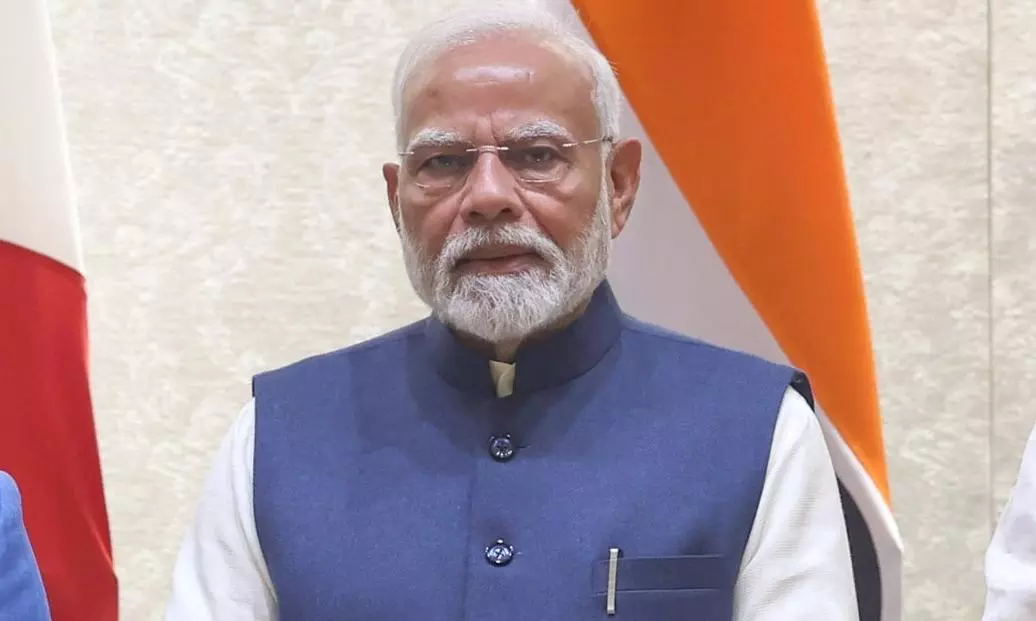Modi Bats for Swift Justice in Crimes Against Women

NEW DELHI: Hailing the judiciary as the "Guardian of our Democracy”, Prime Minister Narendra Modi on Saturday underlined the need for "swift" justice in cases involving crime against women and said that it will accord them greater assurance of their safety. Mr Modi's remarks come against the backdrop of the rape-murder of a Kolkata doctor and sexual assault on two kindergarten toddlers in Thane district of Maharashtra.
Flagging the "burning issue" of atrocities against women and the safety of children as a matter of serious concern, Mr Modi said, "The faster the verdict is delivered in cases of atrocities against women, the greater assurance half of the population will have about their safety."
Highlighting that the judiciary has upheld the spirit of justice since Independence, Mr Modi praised the judiciary for playing an important role in protecting the Constitution even during the troubled times of Emergency.
The Prime Minister said the people of India have never shown any distrust of the Supreme Court or the judiciary. Dubbing the imposition of the Emergency as a "dark" period, Mr Modi said that the Supreme Court also protected the citizens against attacks on fundamental rights and whenever the question of national security arose, the judiciary protected the unity and integrity of India by keeping the national interest paramount.
The Prime Minister was speaking while inaugurating the national conference of district judiciary in the national capital, where he unveiled a stamp and coin commemorating 75 years of the establishment of the Supreme Court of India.
Addressing the event in the presence of Chief Justice of India D.Y. Chandrachud, the PM highlighted the need for swift justice in cases involving crimes against women. The discussions during the two-day conference will yield valuable solutions for the country and will strengthen the path to "justice to all", he said.
Referring to the issue of atrocities against women and the safety of children, the Prime Minister said it was a matter of serious concern.
Noting that stringent provisions have been made in laws for the safety of women, Mr Modi referred to the fast-track special court scheme launched in 2019.
"The faster the verdict is delivered in cases of atrocities against women, the greater assurance half of the population will have about their safety," he said, adding that the district monitoring committees, comprising the district judge, the district magistrate and the superintendent of police, can play a key role.
Pointing to the important role of the panel in coordinating between various aspects of the criminal justice system, Mr Modi stressed the need to make these committees more active.
The R.G. Kar Medical College and Hospital incident in Kolkata triggered nationwide uproar and has also become a flashpoint between the TMC government in West Bengal and the BJP-led NDA government at the Centre. On Friday, West Bengal chief minister Mamata Banerjee wrote to Mr Modi, reiterating her request for stringent Central legislation and exemplary punishment for heinous crimes like rape and murder.
Ms Banerjee, facing flak from various quarters, including the Constitutional courts, wrote to Mr Modi a few days back on the issue following widespread protests by doctors across the country over the August 9 rape and murder incident in Kolkata. Ms Banerjee has pitched for mandatory provision for time-bound disposal of cases of rape/rape and murder.
In response, Union minister Annapurna Devi asserted that existing laws were stringent enough to tackle violence and crimes against women and urged the West Bengal government to implement the same in "letter and spirit". She also lamented that the state government has not created the sanctioned fast-track courts for crimes against women and cases under the Protection of Children from Sexual Offences (POCSO) Act 2012.
The Centre launched the fast-track special court (FTSC) scheme in 2019 to tackle pending cases of crimes against women and those filed under the POCSO Act. Since its inception, these courts have disposed of more than 2.53 lakh cases.
Terming the judiciary as a "strong pillar" of the vision of a developed India, the Prime Minister said the district judiciary is the foundation of the Indian judicial system. "The common citizen of the country first knocks on your (the lower courts) door for justice. Therefore, this is the first point of justice. This is the first step," he said.
On suggestions to improve judicial infrastructure, the Prime Minister said in the last 10 years, efforts have been made to make justice accessible. Work is being done on mission mode for the modernisation of courts, for which the Supreme Court and the judiciary have played a big role by extending cooperation.
Mr Modi asserted that India is moving towards creating a unified technology platform that incorporates emerging technologies like artificial intelligence and optical character recognition and said that such technological platforms will help analyse pending cases and predict future cases as well.
The Prime Minister highlighted that technology will integrate and speed up the work of various wings like police, forensics, jail and court. "We are moving towards a justice system that will be completely future-ready," Mr Modi said. He urged the judiciary to adapt to technology for faster delivery of justice.
The national conference of the district judiciary has been organised by the top court to mark 75 years of its establishment.
In his address, the CJI said district judiciary is the "backbone of the judiciary" and thus a crucial component of the rule of law and calling it "subordinate" must be stopped.
Justice Chandrachud said: "The spine is the core of the nervous system. To sustain the spine of the legal system, we must stop calling the district judiciary the subordinate judiciary."
Supreme Court Bar Association president Kapil Sibal said the fact that trial court and district and session courts are loath to grant bail in certain significant matters itself is "symptomatic of the malaise" that has set in.

